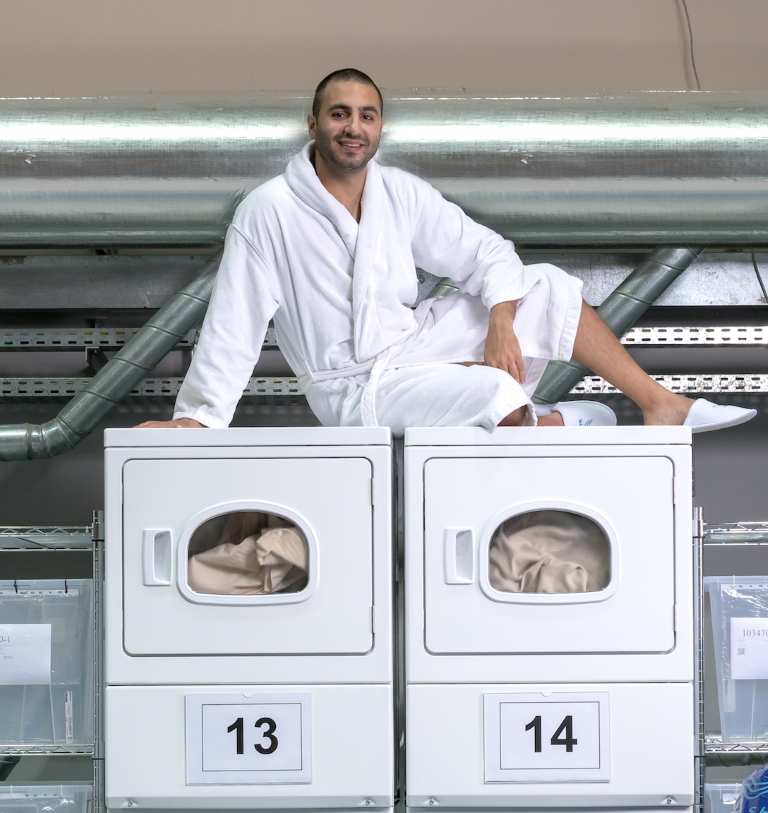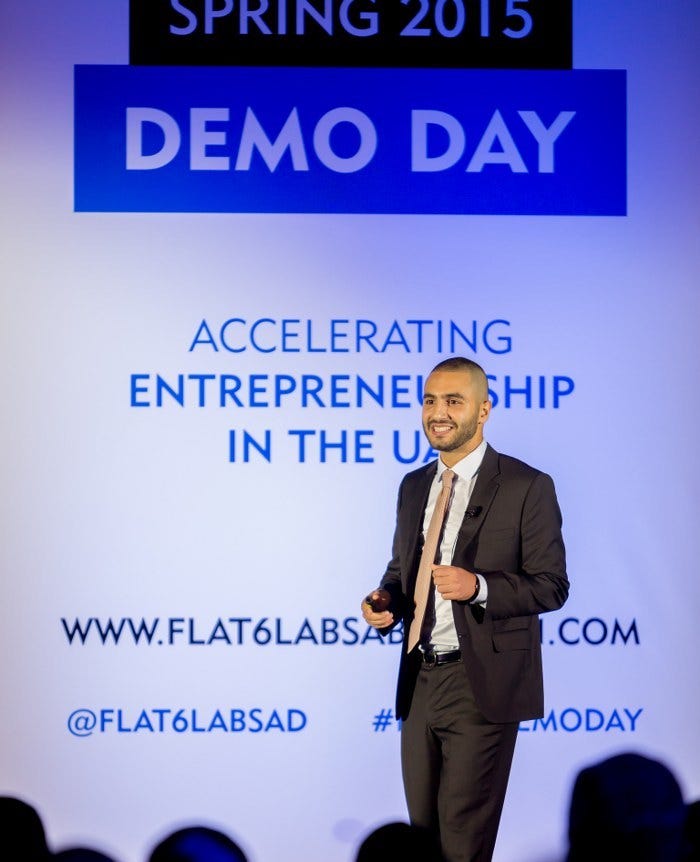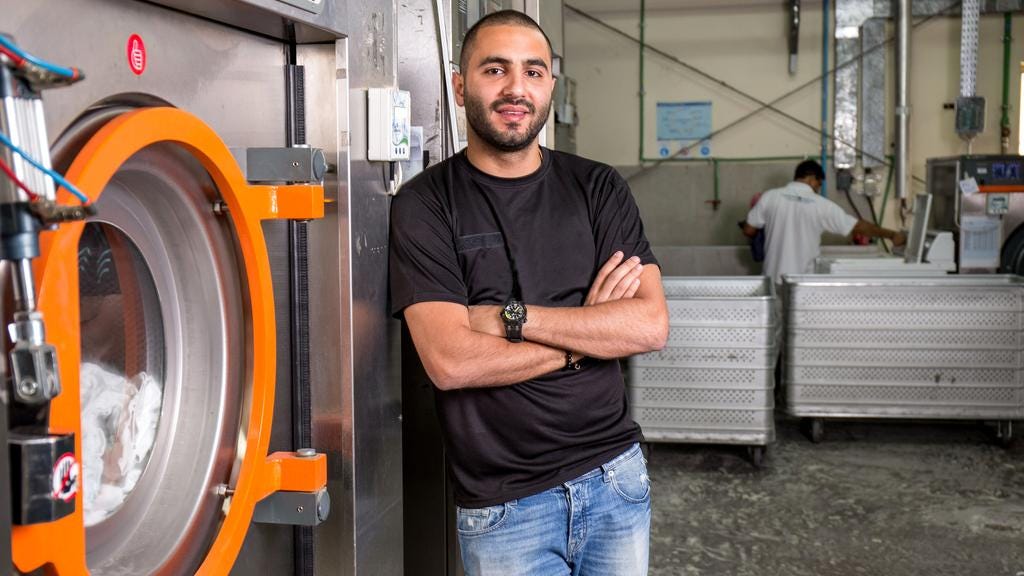The Story Behind Amounting Millions of Investments From Laundry
Leaders are catalysts of change, they innovate after years of wear and tear to civilisations-old manuals. After graduating from Flat6Labs Abu Dhabi’s Spring 2015 cycle, the laundry startup, Washmen, was already on a path to becoming one of the leading laundry shops in the UAE. We sat with its CEO & Co-founder, Rami Shaar, to talk about how they are revolutionising the laundry industry, the backstory to their success, their plans for the future in regards to their services, and how they plan on allocating the most recent investments towards scaling and development.
Why did you decide to localise your service in a plant of your own instead of outsourcing to local laundry shops?
There isn’t a lot of good quality, or big players in the market who’d give us a price that makes sense for the business and the quality. Hence, we thought that it’d be a good idea for us to build our own facility, which would eventually give us a 5x scaling opportunity. It helped us — significantly — improve the quality. Also, we had gotten into a stage in the business where running a very large facility is equal to the cost of outsourcing. It just didn’t make sense to outsource anymore. Especially given that if we start scaling further past it, it will give us more gross profits; since we will have the ability to acquire new customers with more items for laundry. So the reasons are mainly financial and operational.
Do you think owning a plant brings with it more operational complexities?
There is a certain limit to how much we can force our suppliers to use our tech, and to integrate them deep into their operations because they are not willing to accept certain ways on how to do business.
We can say that the way we do things is more operationally efficient, and we collectively have decided that the best way to move forward and to manage our supply chain was by owning the facility. In addition, owning our own facility allows us to build tech that was very deep into the supply chain, and to be consistent with out quality.
Hence, with our dependence on our own factory, our services can be more customisable, especially given that we can build more tech within the operations to be able to follow up on specific instructions of our customers.
We are also working on developing a camera monitoring technology that will allow us to monitor, pinpoint and know where to put accountability when it comes to damages and lost goods. It goes towards monitoring employees and processes to see how efficiency can be improved.

What differentiates your services from similar ones in the market?
If something gets damaged or lost, in this industry, consumer rights dictate that companies are to pay 10 times the price of the service. For us, we are more confident that we won’t damage or lose any goods, so we offer 20 times the price of the service. Sometimes we even go above and beyond if we know that there is negligence on our part. That’s really the overall quality, the overall operations, and how it translates to lower risk towards the customer.
Moreover, in our app, we have a call centre and a live chat function; and we also have founders who are very involved with our customers. Having a direct channel of communication with our customers allows us to also improve our services through feedback, and to understand what is it exactly that our customers want in order for us to have a better product-market fit.
Logistically speaking, using the app is much easier than calling somebody. This can be attributed to having a pickup and drop off service, so the customer doesn’t really need to drive anywhere. We also have online payments, and not a lot of players in the market offer that, and we have a much higher quality that is non existent in the market at the moment.
Something that really stands out now at washmen, is that we have introduced commercial hand washing, and commercial hand drying. Basically, it is a process that mimics hand-wash, and hand dry, but we do it industrially in the facility. This is mainly done through very special machines. Also, we have plans for a shoe cleaning service because a lot of our customers have been asking for it, so that’s next in line.
Do you think that your service can be integrated into AIs like Google Assistant, Siri, Alexa, etc…?
That’s actually coming out in the next two weeks. We’re working on being able to have a conversation with Siri to order your laundry. It is actually part of the iOS 13 launch; and we’ve partnered with Apple to become a part of their Siri Conversations. Later, we will be moving to Google Assistant and Alexa and all that. The idea here is not just to be cool, but the idea here is how we can make the process even more efficient to our customer through the use of AI. There are also a couple of interesting things out there like IBM Watson, and we could integrate it alongside our service agents, where IBM Watson learns from how our service agents work and he can take part in managing our customer complaints, feedback, and give them support, all using AI.
What is the biggest challenge that comes with over $6m worth of investments?
We were pretty confident after we have done our R&D that we will be capable of putting any amount of investment into good use. However, I think the biggest challenge is always growth and scaling demand. It is great to have a “kickass” facility, but at the same time you are building for scalability, so if you don’t achieve that growth and scalability then the story ends. It is very important to be operationally excellent and have scalability in hand. The major challenge going forward, is continuing to scale the demand side of the business, not just the operational. Regardless, we’re very data driven, and we have a lot of tech tools that aid our quest in scaling and growing.

What is your biggest achievement so far?
Besides the +$6m of investments and getting amazing partners like Henkel, I think that would be building the strongest know-how of laundry in the whole world, whether it is offline or online.
Laundry has always existed since the beginning of civilisation, we were always washing clothes and after all those decades, we as a company have done things better than all civilisations have ever done. We’ve innovated in four years, much more than any other civilisation has done.
If you look at the dry cleaning and laundry services in the last few years, they haven’t changed. They use the same machines, the same chemicals, and the same processes. We’re a global leader in our know-how of how to do laundry. Research and interviews have been conducted in everything related to laundry, and they concluded that what we’ve developed here is miles away from a lot of players out there.
So yes, we are a company based out of Dubai, but we are a global company in the know-how that we have.
How do you think this industry in the MENA will change in the upcoming years?
It is similar to how the food online delivery business were back in the day, it wasn’t that easy to order food from your phone. You needed to call someone, pay cash, etc.. People were cooking at home and bringing their lunches to work, but now as we become more consumed with work, having access to such apps saves us time and effort that we’d rather spend on work. That kind of convenience can be replicated in laundry, where in the future people might actually stop using and depending on home appliances or even buying them to wash their stuff, and instead outsource them to a company like us.
Do you have any plans of expansion inside the MENA or Dubai?
Currently, no. We’re actually looking for bigger markets outside Dubai and MENA, since most of our investors, are invested in laundry operations located inside: London, New York, and South Korea. These places have huge competition and opportunities for high growth, but none of them have the technologically efficient and standardised quality that we have.


